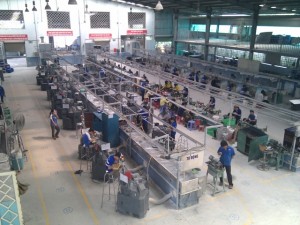Overtime Restrictions for Vietnamese Workers
 In recent years, foreign enterprises have proposed to extend the maximum overtime working hours for Vietnamese workers, but such proposals have been repeatedly declined by the Ministry of Labor, Invalids and Social Affairs, citing health of local workers.
In recent years, foreign enterprises have proposed to extend the maximum overtime working hours for Vietnamese workers, but such proposals have been repeatedly declined by the Ministry of Labor, Invalids and Social Affairs, citing health of local workers.
Under the Labor Code (Law No. 10/2012/QH13), the total overtime working hours are at most 200 hours per year or under special circumstances, 300 hours per year. The maximum number of overtime hours for Vietnamese workers is more restricted compared to regulations in other Southeast Asian countries. While the total normal and overtime working hours for employees in Vietnam should not exceed 30 hours per month, the overtime limit is up to 104 hours per month in Malaysia and 72 hours per month in Singapore.
This limitation has caused difficulties for foreign companies, especially in manufacturing and business operations, and may greatly impact foreign investors’ decisions to invest in Vietnam. Although Vietnam has been known for its low labor cost, productivity levels are still relatively low, spurring some investors to lobby for adjusting the overtime cap of laborers to 300 hours for normal industries and 400 for special situations.
 RELATED: Dezan Shira & Associates’ Payroll and Human Resource Services
RELATED: Dezan Shira & Associates’ Payroll and Human Resource Services
Minimum wages increased in 2015
Decree 103/2014/ND-CP, which came into force this year, prescribes the minimum labor wages. The minimum monthly salary is VND3.1 million (US$142) for urban areas (Region I), VND2.75 million (US$126) for suburban areas (Region II), VND2.4 million (US$109) for provinces (Region III), and VND2.15 million (US$98) for rural areas (Region IV).
Minimum monthly salaries for Vietnamese workers are still relatively low compared to other countries in Southeast Asia. The minimum in Indonesia is US$204, in Thailand US$266, and in the Philippines US$243.
 RELATED: Yarn Forward’s Effect on the Trans-Pacific Partnership and Vietnam
RELATED: Yarn Forward’s Effect on the Trans-Pacific Partnership and Vietnam
For certain industries, such as textiles and food processing, the overtime cap might hinder foreign investors from meeting the enterprises’ productivity and sales goals. One suggestion is that the overtime hours limit should be determined based on an agreement between employers and workers, so that local workers may work overtime if they are willing to and foreign enterprises may ensure their outputs. For now, investors should examine overtime limits when planning their human resources strategy.
|
Asia Briefing Ltd. is a subsidiary of Dezan Shira & Associates. Dezan Shira is a specialist foreign direct investment practice, providing corporate establishment, business advisory, tax advisory and compliance, accounting, payroll, due diligence and financial review services to multinationals investing in China, Hong Kong, India, Vietnam, Singapore and the rest of ASEAN. For further information, please email vietnam@dezshira.com or visit www.dezshira.com. Stay up to date with the latest business and investment trends in Asia by subscribing to our complimentary update service featuring news, commentary and regulatory insight. |
Import and Export: A Guide to Trade in Vietnam
In this issue of Vietnam Briefing Magazine, we provide you with a clear understanding of the current business trends related to trade in Vietnam, as well as explaining how to set up your trading business in the country. We also attempt to give perspective on what will be Vietnam’s place in the Association of Southeast Asian Nations (ASEAN) in 2015, and look at some of the country’s key import and export regulations.
 Using Vietnam’s Free Trade & Double Tax Agreements
Using Vietnam’s Free Trade & Double Tax Agreements
In this issue of Vietnam Briefing we explore how Vietnam’s Free Trade Agreements – and especially those via its membership in ASEAN – will affect foreign investment into Vietnam. We also go a step further and examine the specific, bilateral Double Tax Agreements that Vietnam has enacted, and how these can be further used to minimize profits and withholding taxes that would otherwise be levied upon foreign investors.
 Developing Your Sourcing Strategy for Vietnam In this issue of Vietnam Briefing Magazine, we outline the various sourcing models available for foreign investors – representative offices, service companies and trading companies – and discuss how to decide which structure best suits the sourcing needs of your business.
Developing Your Sourcing Strategy for Vietnam In this issue of Vietnam Briefing Magazine, we outline the various sourcing models available for foreign investors – representative offices, service companies and trading companies – and discuss how to decide which structure best suits the sourcing needs of your business.
- Previous Article Samsung Takes Advantage of Vietnam’s Developing Workforce – Expands Number of Local Employees
- Next Article Vietnam Human Resources to Improve With Increasing Education Investment










